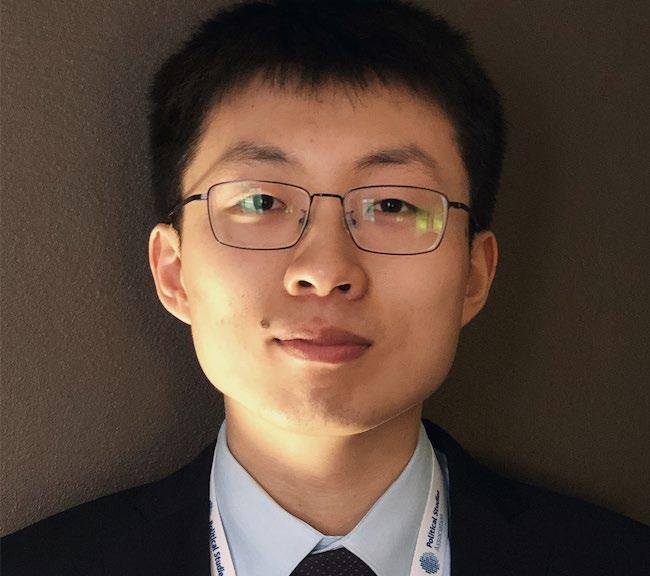
4 minute read
Message to World Leaders from LSE Maryam Forum Student Leaders
We divide history into two parts, the one we like to remember, and the one we seek to actively forget. With an effective distribution of a vaccine still far off, it is important to think about how we will remember COVID-19. The pandemic has been a watershed for all of us. It has shaken us to the core, challenged our innate sense of invulnerability, and forced us to question everything, from our healthcare systems to the legitimacy of our governments.
We, the next generation of leaders, have expected a lot from our current leaders. The COVID challenge is enormous. It can be overcome only if the world is able to unite, drawing on our diversity and power of collective wisdom. Yet what we have seen too often is distrust and division. Many leaders have failed us by not acting quickly and disregarding/abandoning global cooperation; others have even profited from corruption in the face of a global emergency. We have suffered enormously from this unspoken collective trauma. We now suggest radical changes to ensure that lessons are learnt from this crisis. As the young citizens of nations, we respectfully demand a shift in perspective to find a new momentum: • We demand that our leaders ensure transparency, trust and national unity along with robust economic measures. Leaders that stand in solidarity are especially valuable now that we have come to terms with how fragile we are as a human race. • We need our leaders to build resilient governments that can effectively manage crises, with the wellbeing and protection of their citizens at the forefront of policy decisions. • We demand the leaders of developed countries that have a comparative advantage in the production and distribution of vaccines to join hands and build partnerships across the world, by combining their capacities in making testing mechanisms, vaccines and treatments accessible to everyone, regardless their age, gender or socioeconomic status. In our global world we are protected only if all of humanity is protected. • We request that countries which have been more resilient support developing countries to deal with the economic impact of COVID-19 and to tackle job losses and economic and financial instability. • We ask leaders of the developing world to adapt “smart” targeted
policies in which lockdowns do not disproportionately affect the most vulnerable. • We ask leaders to design policies for recovery and post-COVID growth that help reduce poverty and inequality. We suggest inclusive recovery strategies that do not leave anybody behind and ensure communities such as migrants and refugees also get access to medical services. • We strongly support ”build back better” policies from the pandemic to confront the climate crisis and change global attitudes and intentions. Climate change is a looming emergency where we expect our leaders to take action and preserve what is truly important: the planet. Our leaders must ensure governments and industries are active defenders of the planet.
Therefore, we expect strong green and blue recovery packages. • We demand more representation by young citizens in tax reforms and social benefits policy. As our economic systems are under tremendous stress, much of the burden will be intergenerational.
We seek to actively participate and shape economies to build
Doménica Avila, Human Mobility work stream Hassan Gali, Global Emergencies & Responses John Gordon, Rethinking Global Finance and the Global Financial Architecture


back better, with green-minded investments and decent jobs. • We demand leaders and governments devise strategies that effectively tackle disinformation.
In an era of massive disinformation with devastating real-world impacts, we want healthy democracies with competing ideas instead of struggling democracies flooded by strategic misinformation and fake news/propaganda. We reject information that seeks to divide our societies and dismantle vital institutions. • We ask our leaders to look beyond winning elections and redirect their focus and politics towards good governance. The leaders of today need to ask what kind of legacy they want to leave behind, and what kind of world their children and grandchildren will inherit. • Finally, we ask our leaders to hear the fresh perspectives, the digital nativism, and the activism from young people in every corner of the world, in every debate and every policy design. We need policymaking to be inclusive, with representation of the young generation from around the world.
We need you to please trust us
We, the next generation of leaders, have expected a lot from our current leaders. The COVID challenge is enormous. It can be overcome only if the world is able to unite, drawing on our diversity and power of collective wisdom. Yet what we have seen too often is distrust and division. Many leaders have failed us by not acting quickly and scuttled global cooperation; others have even profited from corruption in the face of a global emergency.
and listen to us. We are eager to contribute with ideas and creativity to frame recovery strategies and shape the future of the next generation.
This is why, as young citizens from around the world, we are joining platforms where our voices can be heard. This is why we have joined the Maryam Forum, where we work with policy-makers, business leaders and academics to seize the moment and rise beyond the COVID crisis. ◆
Mahima Andrew, Maryam Forum Secretariat

Ben Grazda, Democracy & Disinformation Karina Rodriguez, Climate Change & the Ocean Jintao Zhu, Innovation & Inclusive Growth












